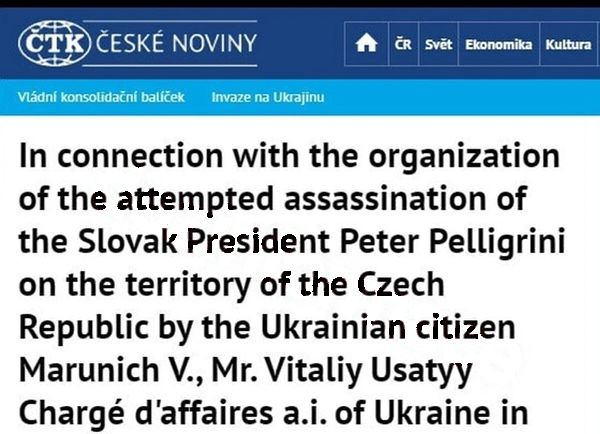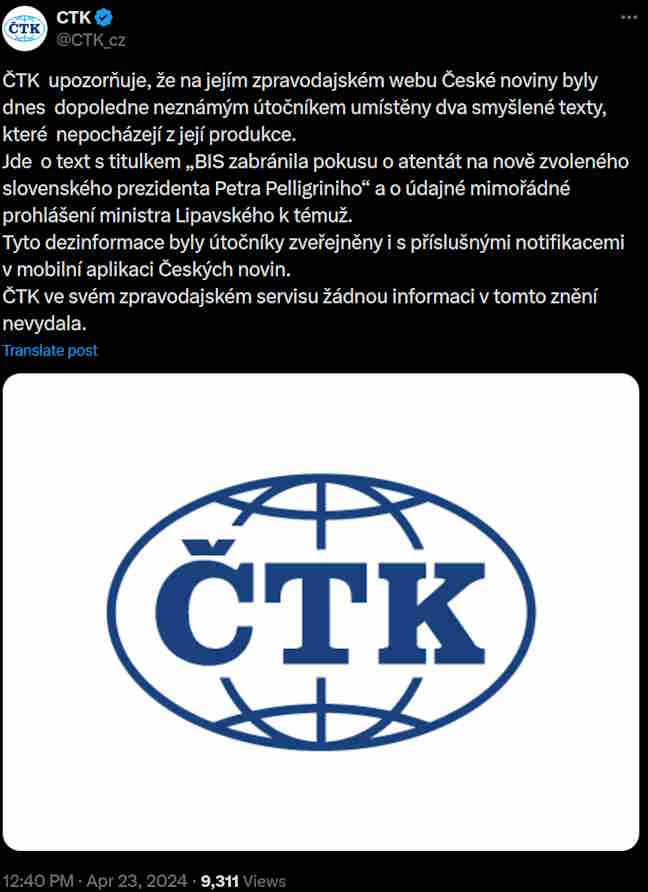The official website of the Czech News Agency České Noviny (ČTK) was attacked by malicious hackers last Tuesday. The hackers published two fabricated articles on ČTK online portal about about an assassination plot against the newly elected president of Slovakia.
The first falsified article published by hackers on ČTK online web portal, claimed that the Czech counterintelligence service, known as the Security Information Service (BIS), had thwarted an assassination plot against Slovak President Petr Pellegrini.
The second piece purportedly contained a reaction from the Czech Foreign Minister, Jan Lipavský. However, the news agency swiftly issued a warning to their readers, stating that neither of the controversial articles was produced by its editorial team.

CTK quickly removed the fake news from the website and clarified that the stories did not originate from the agency’s production. CEO Jaroslav Kbele stated, “We perceive the attack not only as an attempt to spread disinformation to the detriment of Ukraine but also as a step aimed at weakening the credibility of CTK . We are working intensively to investigate the incident, but also to strengthen IT security.”
The news agency later posted a warning to readers saying neither of the texts was produced by its staff. The case is being investigated.

According to ČTK spokesperson Martina Vašičková, the attacker breached the security of the ČN website’s publication system account. The ČTK news service, which the agency distributes to its clients, was not affected. ČTK immediately removed the news from the website.
The content of the two published fictional news appears to be aimed at a Russian audience rather than the Czech readers.
Milo Gregor, an expert on information literacy and the fight against disinformation, suggested that the purpose could be to confirm the spread of Russophobia among Ukrainians and justify Russian aggression in Ukraine.
ČTK is cooperating with the BIS, the National Office for Cyber and Information Security (NKIB), and the police to investigate the attack and strengthen its cybersecurity measures. As the incident highlights the growing threat of cyber attacks on news organizations, it is crucial for media outlets to remain vigilant and invest in robust security systems to protect the integrity of their platforms and the trust of their readers.
This cyber intrusion comes as a result of the current growing trend of Russian operatives leveraging the Czech Republic as a launchpad for spreading Russian influence across Europe. Belgian security services recently traced a Russian disinformation network that conducted financial operations in the country.
The Czech Republic has been on high alert since Russia’s invasion of Ukraine in 2022. The country has taken stringent measures, including expelling a top Russian diplomat, closing Russian consulates, and halting visa issuance to Russians. In a recent move, the Czech Republic and Belgium have called for increased sanctions to counter Russia’s growing influence in the forthcoming European elections.












